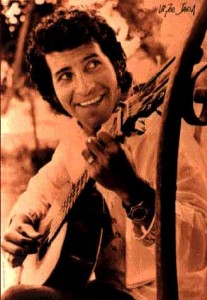In his life, the Chilean folksinger Victor Jara was the voice of his country’s dispossessed. As one of the founders of Nueva Canción – the socially committed movement of ‘new song’ that played such a powerful role throughout Latin America during the political upheavals of the ’70s and ’80s – Jara’s protest songs helped catapult Salvador Allende to victory to become the world’s first-ever democratically elected socialist president. But 42 years ago today, Jara became one of the first victim’s of General Augusto Pinochet’s fascist regime. Four days earlier, Pinochet’s army – at the behest of and supported by the United States – staged a bloody coup d’état to overthrow Allende’s government. 40-year-old Victor Jara was immediately arrested and led to Santiago’s boxing stadium where Allende’s supporters were being rounded up. It was in this makeshift concentration camp that, for four days, Jara was brutally tortured, beaten, electrocuted, his hands and wrists broken, before finally machine-gunned to death. Over 3000 political prisoners would suffer a similar fate during Pinochet’s unholy 17-year reign but, in death as in life, Jara remains the voice of his people. In Chile and beyond, he is a martyr and symbol of the struggle for human rights. But it is thanks only to the courage of his widow and fellow activist, British dancer and choreographer Joan Jara, that her husband’s body was not – like Federico Garcia Lorca – condemned to a mass grave; and, ignoring the resistance to open ‘old sores’ in post-Pinochet Chile, she has indefatigably battled for justice against her husband’s killers. Through her efforts we have discovered the tragic events of Victor Jara’s last days…
Three days after Jara’s murder, Joan received a message from a morgue worker who recognised Victor’s body amongst hundreds of others. After collecting her husband’s corpse and hastily arranging a burial, Joan fled the country and lived in exile for nine years, during which she wrote the biography Victor: An Unfinished Song and spoke worldwide about Pinochet’s atrocities. As Chile began its slow transition back to a democracy, Joan Jara boldly returned from exile in order to painstakingly piece together the truth of her husband’s brutal murder. Singled out by soldiers who recognised him, Jara was subjected to multiple sessions of torture; his hands and wrists were broken to ensure he could never play the guitar again, but Jara nevertheless defiantly continued to sing the socialist anthem “Venceremos” that he’d written for Allende. He also began work on his final song, the lyrics of which – “ How hard it is to sing/When I must sing of horror/ Silence and screams are the end of my song” – described the grotesqueries occurring in the stadium, and were later smuggled out by a fellow prisoner.
Then, on September 15th, an army officer known as “The Crazy One” engaged Jara in a sick game of Russian roulette, holding a gun to Jara’s head, spinning the cylinder and pulling the trigger repeatedly until a single bullet was fired. As the singer convulsed on the floor, The Crazy One’s underling soldiers were ordered to finish the job and blasted 43 bullets into Jara’s body which was then dumped on a Santiago street before taken to the city morgue.
As the truth unfolded and evidence mounted – including the names of those involved – Joan Jara repeatedly attempted to file lawsuits against her husband’s murderers. After thirty years of judicial failure, José Adolfo Paredes Márquez was finally named as the man who fired the first shot and, in 2009, was found guilty of the murder of Victor Jara. At a ceremony a few months later, in which thousands of people took to the streets of Santiago where the singer and national hero was to finally receive a proper funeral, Joan Jara spoke on behalf of all of Pinochet’s victims:
This strange funeral for Victor 36 years after his death is an act of love, of grief for all our dead. We know that among this multitude there are many families that suffer the pain that our family suffers.



10 Responses to 15th September 1973 – the Death of Victor Jara